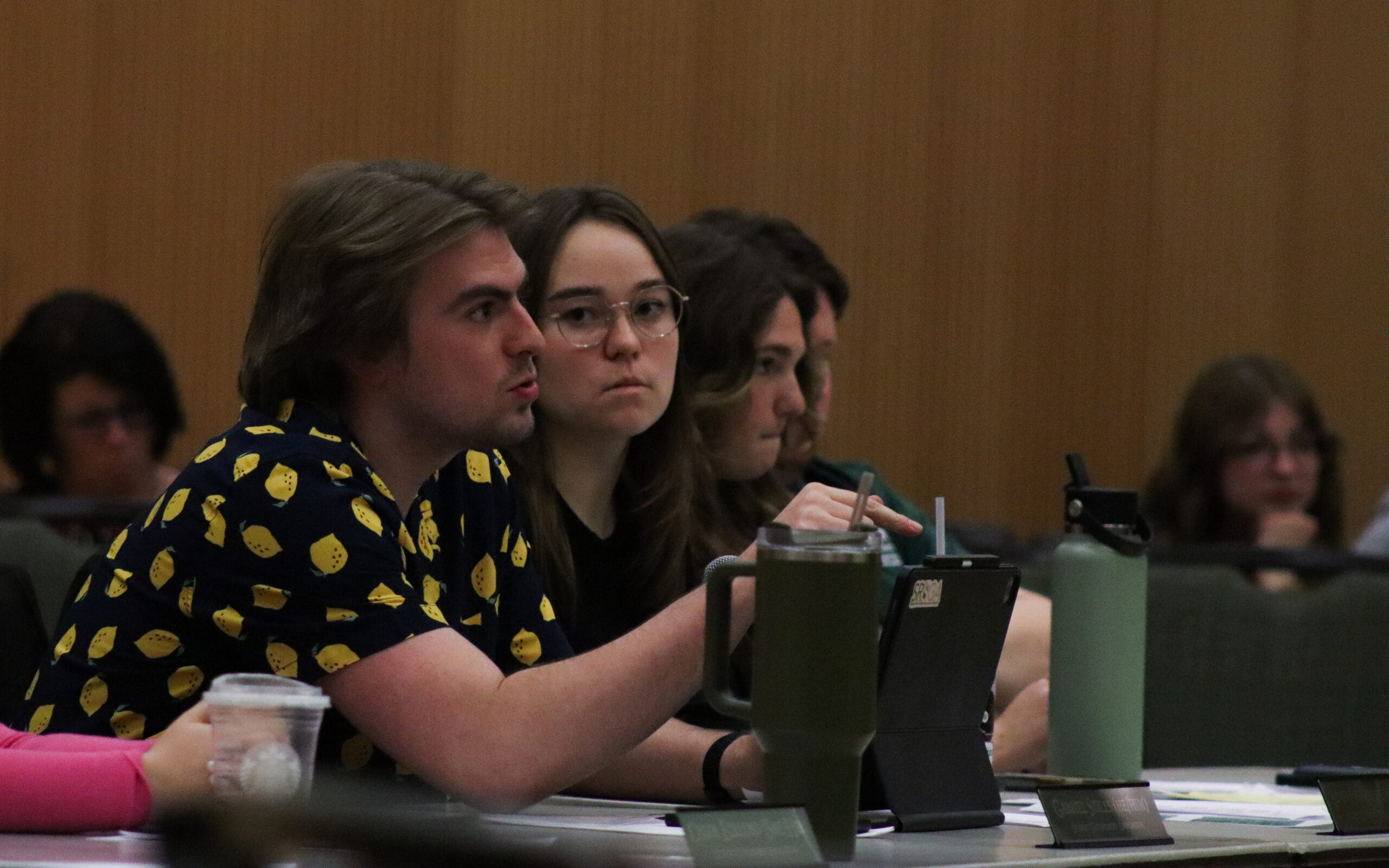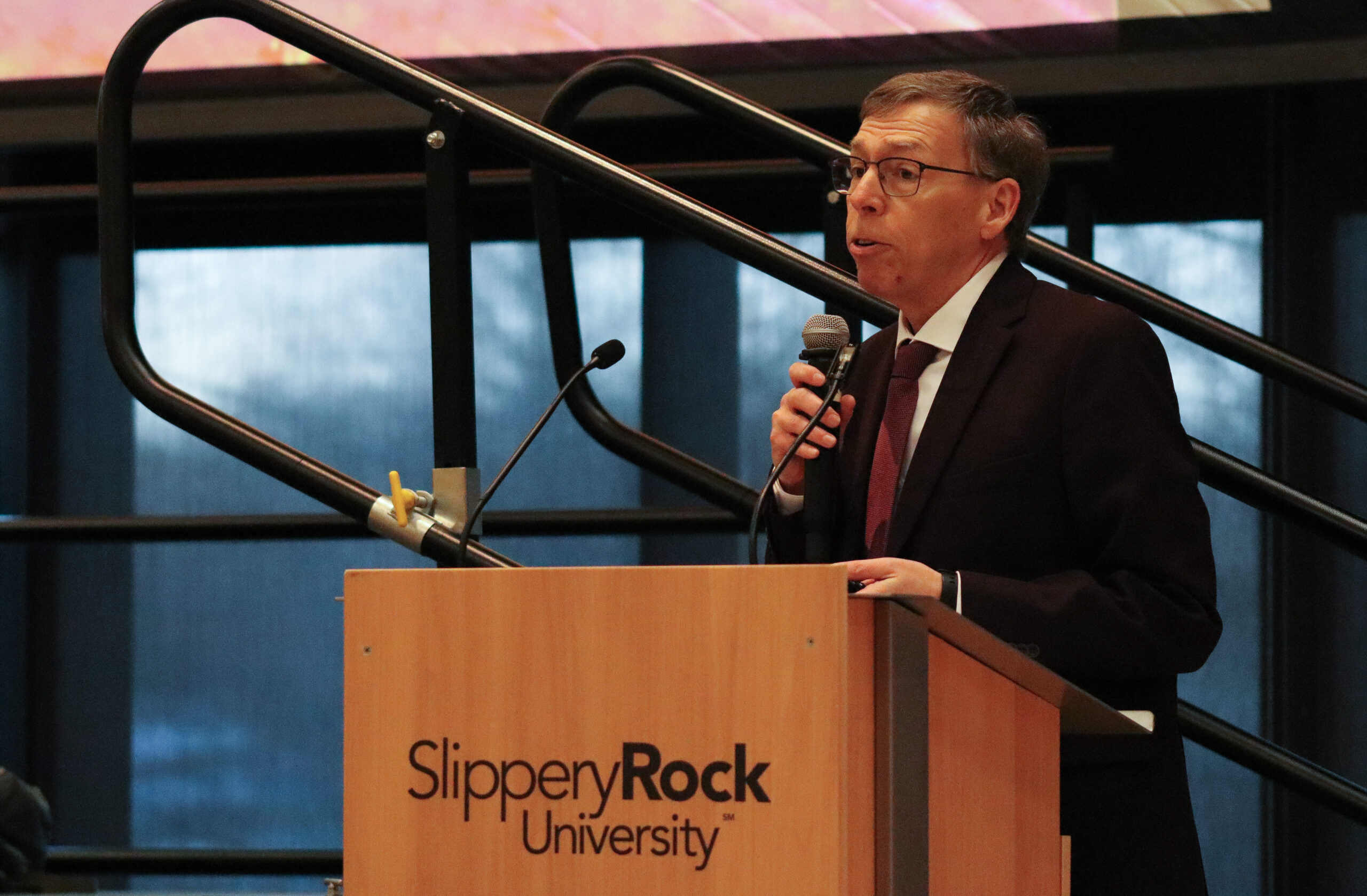
Editor’s note: This story was edited for factual clarifications. Edits were made Feb. 29, 2024.
The Student Government Association approved a Turning Point USA (TPUSA) university chapter and an increase in auxiliary fees during Monday’s meeting.
All additional motions passed in the SSC Ballroom including recognition of four other student organizations, Feb. 19’s financial report and approval for future amendments to the SGA constitution.
Turning Point USA

TPUSA is a conservative nonprofit organization founded by right-wing activist Charlie Kirk in 2012, according to their website. The organization’s mission statement is “to educate students about the importance of fiscal responsibility, free markets, and limited government.”
Recognition of TPUSA as a student organization included a 45-minute-long open forum and 30-minute debate prefacing the vote.
Laying the ground rules, Parliamentarian Ezcek Warren stated if TPUSA was denied access as a student organization, the chapter could still operate on campus within the code of conduct. If denied approval, they would not be present in CORE or receive funding from SGA.
Warren endorsed passing the motion, citing Article 8 of the SGA Constitution where he said TPUSA and its binding documents have “checked all the boxes” to become a student organization. Warren also said he was not sure about the legality of denying the organization entry, possibly opening future lawsuits, something TPUSA pursued at other universities.
“We are not approving Charlie Kirk, we are not approving the parent organization at all, we are approving whether or not there should be a Slippery Rock University branch of [TPUSA],” he said.
Warren guaranteed “swift justice” for any action violating code of conduct for student organizations.
Warren further explained via email that “hate speech is not listed as an offense in our code of conduct unless it directly threatens or encourages violence.”
“My overall course of action is we pass it. I believe that is the right move going forward but we keep our eyes peeled,” Warren said. “If we have a weed growing in our midst, we cut it in the bud.”
President Ella Bloom commented during the debate, reminding senators of their duty.
“You are representing students,” Bloom said. “We want to lead as people who have open minds and can take into consideration all perspectives.”
College of Education Senator Gabriel Stiles voiced concern over the reputation TPUSA would bring to SRU and SGA, citing certain TPUSA member’s “going against the LGBT+ community.” He also cited its listing as an extremist organization by the Anti-Defamation League
“There is no benefit to having this organization here,” Stiles said.
He also cited TPUSA’s professor watchlist putting faculty and staff at risk.
“When you think about the safety of our educators, that is what is at risk when we propose and approve organizations like this,” Stiles said. “Professors can feel intimidated to teach what they have spent thousands of dollars and years of their lives doing, which jeopardizes the education we are receiving.”
Stiles pointed towards the College Republicans as an alternative to receive approval and funding, where he said TPUSA will already have funding from its nonprofit, worth over $26 million, and therefore should not be approved.
First Year Senator Owen Maharg shared sentiment with Stiles, arguing for the revitalization of College Republicans.
“It’s unacceptable for [TPUSA] to exist on campus,” Maharg said. “It’s one thing to say you disagree with the political party’s views but it’s another thing for the organization to be openly pushing forward hate on to a certain group of people.”
Eric Gondella, president of the College Progressive student organization, also spoke during the open forum, where he said TPUSA is a “liability” to universities and a “harmful organization.”
Opposingly to Stiles, who also voiced concern of the liability of TPUSA’s reputation, Gondella proposed allowing the organization to establish an SRU chapter.
“Until they have broken one of the universities policies, they should be allowed to operate,” he said. “I don’t think the people who started [the chapter] have necessarily bad character.”
Gondella compared not recognizing TPUSA to similar actions taken by universities denying student organizations such as Students for Justice in Palestine and Palestinian led organization Boycott, Divestment, and Sanctions.
The president of the College Progressives said he “would disagree with their decision to ban these student organizations based on subjective points of view.”
Transfer Senator Makenzie Hale also voiced concern for TPUSA’s reputation and beliefs, but encouraged listening to the “student want” for the organization.
“At the end of the day, it is not our call entirely to reject this organization,” Hale said. “We are here for the students, so obviously if this club did come up as a concept there is student want for it and as an organization, we have to recognize that.”
Veteran Senator Carla Snodgrass also cited the student interest for the organization.
“We need to remember that those who are trying to push for [TPUSA] are our fellow students, they’re us,” Snodgrass said. “We are to represent everyone, not just our own beliefs.”
Snodgrass also said clubs approved by SGA must have a staffed advisor, another measure ensuring oversight.
College of Engineering and Science Senator Ryan Schmidt offered additional support for the approval of TPUSA citing inclusion of all student views.
“It might not be what we associate DEIB with, but it is DEIB to its foundation,” Schmidt said. “It is written very specifically to not pick based off association of political party.”
Schmidt also proposed voting via secret ballot, an idea shot down by Bloom.
“It will be a hide of how you vote,” Bloom said. “The people that you are representing aren’t going to know how you are voting for them.”
The vote was taken by raise of hands and passed with no abstained votes.
Tuition fee increase

Assistant Vice President of Auxiliary Operations and Student Services Chris Cole prefaced the open forum to explain the proposed fee increases.
The proposed recreation fee increased $20 per semester, or 18%. The last increase was in 2013-2014, resulting in a 26% increase. The increase will bring the recreation finances out of a deficit to end the year in a surplus, according to Cole.
The SSC fees increased $10.50 per semester, or 5%. The last fee increase was in 2015-2016 with a 6% increase. He also stated the SSC faces an operating deficit of $400,000 each year, something he said the additional revenue will not fully cover. Cole said the administration plans to split the funds in half, with one half going towards the deficit and another towards additional amenities.
Dining saw an increase of $73 per semester, or 4.3%. The last fee increase was in 2017-2018 with a 2.29% increase. According to Cole if dining fees are not raised next semester, the service would go into a deficit. He also said he will not ask for another increase for at least two years. Cole said, due to inflation, the cost of food for SRU rose 5.5% in 2022 and 10% in 2023. Cole said he expected Aramark to ask for an additional 5.4% increase in fees this year to match the CPI for food.
Traditional housing’s proposed increase is $35 per semester, or 2%. The last fee increases was in 2015-2016 with a 2% increase. With a 101% occupation in Fall 2023, traditional housing is in financial surplus according to Cole. He said the plan will not affect current students in traditional housing for two years, only incoming students living on campus will pay the increased price.
To address the housing shortage, Cole said once the Student Union renovation is complete, Rhoads Hall’s first floor will be converted into dorms.
Other motions
All aspects of the financial reports passed, totaling $31,605.
The largest sum was a capital request for WSRU’s automation software and implementation priced at $27,438. Remaining costs included conference grants totaling $816 and new initiatives totaling $4,167.
The recognition of an honors chapter for Pi Theta Epsilon and new organizations NONTRA, Musical Theatre Dance Club and the Service Coalition at SRU were all passed unanimously without debate.







